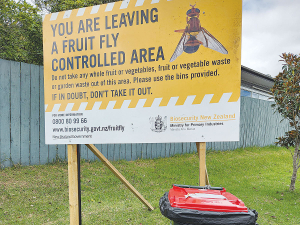Restrictions on fruits, vegetables movement in Mt Roskill
Legal controls on the movement of fruits and vegetables are now in place in Auckland’s Mt Roskill suburb, says Biosecurity New Zealand Commissioner North Mike Inglis.
 Special disposal bins for fruit and vegetables have now been placed throughout Zones A and B in the Birkdale area.
Special disposal bins for fruit and vegetables have now been placed throughout Zones A and B in the Birkdale area.
The quick response to the discovery of another fruit fly in Auckland is being praised by fruit and vegetable growers.
Horticulture New Zealand (HortNZ) chief executive Kate Scott says growers will likely be concerned about the discovery in Birkdale on Auckland’s North Shore.
“Growers will be concerned, as the Oriental fruit fly poses a significant risk to horticulture, with its larvae capable of feeding on more than 300 types of fruit and vegetables,” Scott told Rural News. “Home gardeners would also be affected.”
Scott says New Zealand has strong biosecurity measures in place and the quick response to the detection of this fruit fly proves the system is working.
“Vigilance, surveillance, and containment efforts remain essential to protecting the horticulture sector,” she says.
“Protecting New Zealand’s horticulture sector from biosecurity threats like the fruit fly is critical to our economy and our reputation for producing high-quality fruit and vegetables.”
Late last month, the fruit fly was discovered in a suburban backyard. It followed a similar discovery in Papatoetoe in January.
However, Mike Inglis, Biosecurity New Zealand’s commissioner, north, says that genetic testing has confirmed that – despite being the same species – these are not linked.
It’s not the first time New Zealand has experienced multiple detections like this. Back in 2019, Biosecurity New Zealand responded to fruit fly detections in three Auckland suburbs.
Upon the detection of the fruit fly, trapping in the Birkdale area increased with daily checks in the 200-metre zone surrounding the location of the original find.
Checks are also being performed in the three days in a second zone which stretches to 1,500 metres surrounding the location of the original find.
Legal controls on the movement of fruit and vegetables in Birkdale and nearby suburbs have also been put in place.
“Biosecurity New Zealand thanks the local community in Birkdale and neighbouring areas for their efforts to date and their support of the important work underway,” Inglis says.
“There has been a really positive response from local businesses and residents to the rules around the movement of fruit and vegetables,” he adds.
This marks the fourteenth fruit fly incursion in New Zealand, all of which have been eradicated so far, says MPI.
To report suspected finds of fruit fly, call MPI’s Pest and Diseases Hotline on 0800 80 99 66.
Legal controls on the movement of fruits and vegetables are now in place in Auckland’s Mt Roskill suburb, says Biosecurity New Zealand Commissioner North Mike Inglis.
Arable growers worried that some weeds in their crops may have developed herbicide resistance can now get the suspected plants tested for free.
Fruit growers and exporters are worried following the discovery of a male Queensland fruit fly in Auckland this week.
Dairy prices have jumped in the overnight Global Dairy Trade (GDT) auction, breaking a five-month negative streak.
Alliance Group chief executive Willie Wiese is leaving the company after three years in the role.
A booklet produced in 2025 by the Rotoiti 15 trust, Department of Conservation and Scion – now part of the Bioeconomy Science Institute – aims to help people identify insect pests and diseases.